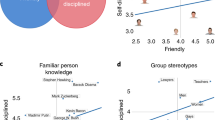Abstract
This experiment tested a number of hypotheses derived from trait theory, attribution theory and interactional psychology. Forty subjects rated the stability and relevance of 60 pre-selected traits of three role-related people and themselves in four specific social situations. The traits were categorized beforehand in terms of their structural, motivational and content properties, and whether they were positive or negative. There was a significant difference in the perceived stability of positive and negative traits between liked and disliked people; positive traits being seen as significantly more stable in liked people and less stable in disliked people. However, subjects did not attribute significantly less stability to their own behavioural traits than to those of others in the same situations. It was also demonstrated that trait labels are seen to be differentially relevant for describing people in different social situations. The results are discussed in terms of the work on stability and cross-situational consistency in trait and attribution theory and person-situation research.
Similar content being viewed by others
References
Anderson, N. (1968). Likeableness ratings of 555 personality traits words. Journal of Personality and Social Psychology, 9, 272–279.
Argyle, M. (1976). Personality and social behaviour. In R. Harre (ed.), Personality. Oxford: Blackwell.
Argyle, M. &: Little, B. (1972). Do personality traits apply to social behaviour? Journal for the Theory of Social Behaviour, 2, 1–35.
Argyle, M., Furnham, A. &: Graham, J. (1981). Social Situations. Cambridge: Cambridge University Press.
Bern, D. &: Allen, A. (1974). On predicting some of the people some of the time: the search for cross-situational consistency in behaviour. Psychological Review, 81, 506–520.
Bowers, K. (1973). Situationism in psychology: an analysis and a critique. Psychological Review, 80, 307–336.
Ebbeson, E. &: Allen, R. (1979). Cognitive processes in implicit personality trait inference. Journal of Personality and Social Psychology, 37, 471–488.
Endler, N. (1976). Grand illusions: traits or interactions? Canadian Psychological Review, 17, 174–181.
Epstein, S. (1979). The stability of behaviour: 1. On predicting most of the people most of the time. Journal of Personality and Social Psychology, 37, 1097–1126.
Eysenck, H. (1967). The Biological Basis of Personality. Springfield, IL: C. C. Thomas.
Forgas, J. (1976). The perception of social episodes: categorical and dimensional representations in two different social milieus. Journal of Personality and Social Psychology, 32, 199–209.
Furnham, A. (1981). Personality and activity preference. British Journal of Social Psychology, 20, 57–68.
Furnham, A., Jaspars, J. & Fincham, F. (1981). Professional and naive psychology: two approaches to the explanation of social behaviour. In J. Jaspars, F. Fincham & M. Hewstone (eds.), Attribution Theory and Research, Volume 1. London: Academic Press.
Gifford, R. (1975). Informational properties of descriptive words. Journal of Personality and Social Psychology, 31, 727–734.
Goldberg, L. (1978). Differential attribution of trait-descriptive terms to oneself as compared to well-liked, neutral, and disliked others: a psychometric analysis. Journal of Personality and Social Psychology, 36, 1012–1028.
Graham, W. (1976). Commensurate characterization of persons, groups and organizations: development of the trait ascription questionnaire. Human Relations, 29, 607–622.
Greenberg, M., Saxe, L. & Bar-Tal, D. (1978). Perceived stability of trait labels. Personality and Social Psychology Bulletin, 4, 59–62.
Hartshorne, H. & May, M. (1928). Studies in the Nature of Character, Volume 1, Studies in Deceit. New York: Macmillan.
Heider, F. (1958). The Psychology of Interpersonal Behaviour. New York: WHey.
Jones, E. & Davis, K. (1965). From acts to dispositions: the attribution process in person perception. In L. Berkowitz (ed.), Advances in Experimental Social Psychology, Volume 2. New York: Academic Press.
Kaigler-Evans, K. & Danhorst, M. (1978). Impression formation: use of descriptors of personal traits, Perceptual and Motor Skills, 46, 903–906.
Kirby, D. & Gardner, R. (1972). Ethnic stereotypes: norms on 208 words typically used in their assessment. Canadian Journal of Psychology, 20, 140–154.
Lehman, H. & Witty, P. (1934). Faculty psychology and personality traits. American Journal of Psychology, 44, 486–500.
Mischel, W. (1968). Personality and Assessment. New York: Wiley.
Mischel, W. (1977). On the future of personality research. American Psychologist, 32, 246–254.
Monson, T. (1981). Implications of the traits vs. situations controversy for differences in the attributions of actors and observers. In J. Jaspars, F. Fincham & M. Hewstone (eds.), Attribution Theory and Research, Volume 1. London: Academic Press.
Monson, T., Tanke, E. & Lund, J. (1980). Determinants of social perception in a naturalistic setting. Journal of Research in Personality, 14, 104–120.
Nisbett, R., Caputo, C., Legart, P. & Marecek, J. (1973). Behavioras seen by the actor and as seen by the observer. Journal of Personality and Social Psychology, 27, 154–169.
Norman, W. (1963). Toward an adequate taxonomy of personality attributes. Journal of Abnormal and Social Psychology, 66, 574–583.
Price, R. & Bouffard, D. (1974). Behavioral appropriateness and situational constraints as a dimension of social behaviour. Journal of Personality and Social Psychology, 30, 519–526.
Rushton, J. &: Endler, N. (1977). Person by situation interactions in academic achievement. Journal of Personality, 45, 297 -309.
Schettler, C. (1941). Some antecedent concepts of personality traits. Psychological Review, 48, 165–175.
Schneider, D.J. (1973). Implicit personality theory: a review. Psychological Bulletin, 79, 294–309.
Snyder, M. (1979). Self-monitoring processes. In L. Berkowitz (ed.), Advances in Experimental Social Psychology, Volume 19. New York: Academic Press.
Taylor, S. & Koivumaki, J. (1976). The perception of self and others: acquaintanceship, affect, and actor-observer differences. Journal of Personality and Social Psychology, 33, 403–408.
Wiggins, J. (1978). A psychological taxonomy of trait descriptive terms: the interpersonal domain. Journal of Personality and Social Psychology, 37, 395–412.
Wish, M. & Kaplan, S. (1977). Toward an implicit theory of interpersonal communication. Sociometry, 40, 234–246.
Author information
Authors and Affiliations
Rights and permissions
About this article
Cite this article
Furnham, A., Endler, N. Attributions of stability and relevance of personality traits. Current Psychological Research 2, 75–85 (1982). https://doi.org/10.1007/BF03186747
Accepted:
Published:
Issue Date:
DOI: https://doi.org/10.1007/BF03186747




